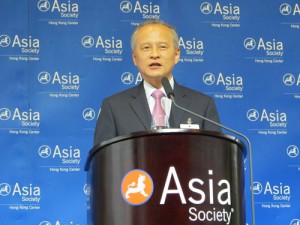
- Today’s news opens with a speech July 5 in Hong Kong by Chinese Vice Foreign Minister Cui Tiankai, a key figure in Chinese relations with the United States. The speech calls for “building a new type of relationship between major countries here in the Asia-Pacific,” a key Hu Jintao phrase from the Strategic and Economic Dialogue (S&ED) between the United States and China in May [speech in Chinese / in English]. The Xinhua storyabout the speech also emphasized this new relationship, suggesting that the idea of something like a U.S.–China “special relationship” is gaining traction in Chinese policy circles.
The remainder of the speech emphasizes the need for expanded mutual trust between the two countries, and the importance of the Asia-Pacific region as a locus for this relationship. None of this is groundbreaking, but I think it’s worth noting that this is one of the highest-level speeches on the United States since the May meetings that coincided with a diplomatic tangle over the fate of Chen Guangcheng, the self-taught lawyer who escaped home detention and entered the U.S. embassy in Beijing, eventually ending up as a special student at New York University Law School. Cui specifically mentions S&ED as a successful development, and calls out U.S. Assistant Secretary of State Kurt Campbell, who, along with Cui, was reportedly at the center of tense negotiations over Chen.
- The other big news come from U.S. President Barack Obama, whose administration has filed a WTO complaint against China over auto tariffs. The timing had clear political content, as Obama is beginning a campaign trip in the Midwest, where much of the U.S. auto industry makes its home.
- Meanwhile, the Committee of 100, a group of prominent Chinese Americans, released its 2012 survey of U.S.–China public opinion [pdf] about bilateral ties. The executive summary is worth a skim, as it contains a laundry list of findings.
- Zhou Yongkang, for one, is not a fan of U.S. opinions on China. According to an AFP story:
“We will never change in our endeavour to defend the party’s leading role and socialism with Chinese characteristics,” he wrote in the latest edition of a Communist Party publication, “Qiushi”.”We will resolutely resist the attacks of hostile forces on our nation’s political and judicial systems, and we will resolutely resist the influence of mistaken Western political and legal views.”
Zhou was writing in his position as head of the party’s Politics and Law Commission, which oversees China’s courts, prosecution and police.
- And the U.S. State Department expressed displeasure with Chinese online censorship after Bloomberg News’ website after its blockbuster story on the family finances of Chinese Vice President Xi Jinping.
As always, there has been movement in the South China Sea
- The Philippines may ask for U.S. spy plane assistance in areas disputed with China, Philippine President Benigno Aquino said, reportedly referring to P3C Orion aircraft. (July 2)
- The People’s Daily that day also accused the Philippines of attempting to stir up trouble in the region ahead of the ASEAN Foreign Ministers’ Meeting July 9. (English of full article.)
- The Philippine military has “no problem” with Chinese patrols near disputed islands, according to a media report, as long as they stay in the “freedom of navigation area”—i.e. international waters where any ship has a right to be. (July 3)
- The Philippines issued a new “note verbale,” a type of diplomatic communication, objecting to China’s plans with its newly upgraded administrative distinction for the administration of some of the islands it claims in the South China Sea, a Philippine news site reports. “Sansha city” officially includes both an island disputed with Vietnam and the Scarborough Shoal, which China and the Philippines disagree over. (July 4)
- Chinese Maritime Surveillance ships are patrolling within 1 nautical mile of the Nansha islands, Xinhua reported.
- The Chinese government announced it would open a research station in the “Zhongsha” islands, part of the controversial Sansha City. A quick check suggests these “islands” are not even above water all of the time, and they have not been part of the recent dust-ups with Vietnam or Philippines. (July 5)
- An Economist story comes with a nice map that includes oil claims.

Leave a Reply